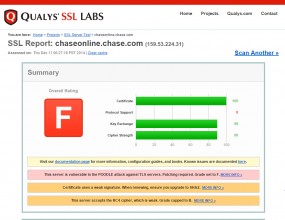‘Poodle’ Bug Returns, Bites Big Bank Sites
jeudi 11 décembre 2014 à 19:06Many of the nation’s top banks, investment firms and credit providers are vulnerable to a newly-discovered twist on a known security flaw that exposes Web site traffic to eavesdropping. The discovery has prompted renewed warnings from the U.S. Department of Homeland Security advising vulnerable Web site owners to address the flaw as quickly as possible.
 In mid-October, the world learned about “POODLE,” an innocuous acronym for a serious security flaw in a specific version (version 3.0) of Secure Sockets Layer (SSL), the technology that most commercial Web sites use to protect the privacy and security of communications with customers.
In mid-October, the world learned about “POODLE,” an innocuous acronym for a serious security flaw in a specific version (version 3.0) of Secure Sockets Layer (SSL), the technology that most commercial Web sites use to protect the privacy and security of communications with customers.
When you visit a site that begins with “https://” you can be sure that the data that gets transmitted between that site and your browser cannot be read by anyone else. That is, unless those sites are still allowing traffic over SSL 3.0, in which case an attacker could exploit the POODLE bug to decrypt and extract information from inside an encrypted transaction — including passwords, cookies and other data that can be used to impersonate the legitimate user.
On Dec. 8, researchers found that the POODLE flaw also extends to certain versions of a widely used SSL-like encryption standard known as TLS (short for Transport Layer Security).
“The impact of this problem is similar to that of POODLE, with the attack being slightly easier to execute,” wrote Ivan Ristic, director of engineering at security firm Qualys, which made available online a free scanning tool that evaluates Web sites for the presence of the POODLE vulnerability, among other problems. “The main target are browsers, because the attacker must inject malicious JavaScript to initiate the attack.”
A cursory review using Qualys’s SSL/TLS scanning tool indicates that the Web sites for some of the world’s largest financial institutions are vulnerable to the new POODLE bug, including Bank of America, Chase.com, Citibank, HSBC, Suntrust — as well as retirement and investment giants Fidelity.com and Vanguard (click links to see report). Dozens of sites offering consumer credit protection and other services run by Experian also are vulnerable, according to SSL Labs. Qualys estimates that about 10 percent of Web servers are vulnerable to the POODLE attack against TLS.
According to an advisory from the U.S. Computer Emergency Readiness Team (US-CERT), a partnership run in conjunction with the U.S. Department of Homeland Security, although there is currently no fix for the vulnerability SSL 3.0 itself, disabling SSL 3.0 support in Web applications is the most viable solution currently available. US-CERT notes that some of the same researchers who discovered the Poodle vulnerability also developed a fix for the TLS-related issues.
Until vulnerable sites patch the issue, there isn’t a lot that regular users can do to protect themselves from this bug, aside from exercising some restraint when faced with the desire to log in to banking and other sensitive sites over untrusted networks, such as public Wi-Fi hotspots.